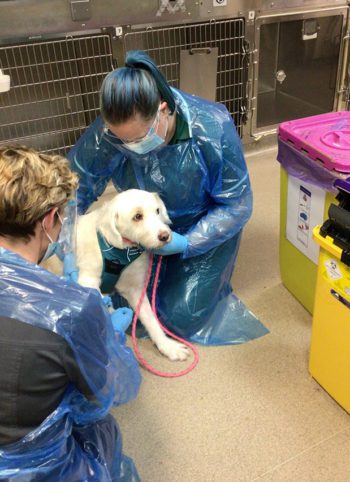20 Feb 2024
Katharine Nelson details the steps taken to treat a cross-breed dog from Romania.

Maggie – a six-year-old cross-breed bitch that was rescued from Romania – arrived in the UK in March 2023.
She had displayed an intermittent, dark, bloody, vaginal discharge ever since arriving in the UK, five weeks prior to presentation.
The rescue charity had advised Maggie’s owners that she had been spayed some time previously.

Maggie’s clinical exam was unremarkable, with the exception of blood staining around the vulva. Ultrasound examination of the abdomen ruled out pyometra. Bloods for biochemistry, haematology and Brucella canis serology were within normal limits.
Vaginal examination under general anaesthesia revealed a friable mass in the cervical region. Exploratory laparotomy revealed that this mass extended into the abdomen and was closely associated with the bowel and bladder neck, such that it was considered to be unresectable.
The bitch appeared to have undergone a complete ovariohysterectomy, and no ovarian remnant tissue was identified.
A biopsy of the cervical mass was taken per vaginam, which precipitated a significant temporary increase in vaginal bleeding. The histopathological diagnosis was transmissible venereal tumour (TVT).
TVT can often be cured with the use of vincristine 0.5mg/m2 to 0.7mg/m2 every week for three to six weeks.
Maggie experienced asymptomatic neutropenia seven days after her vincristine injections; therefore, a modified treatment regime of 0.5mg/m2 every two weeks was used. Treatment was ceased after four doses of vincristine.
The vaginal bleeding reduced significantly after the first treatment and stopped completely after the second. The client noted that Maggie was generally much brighter and livelier than prior to treatment.
No recurrence of vaginal bleeding has been observed, and vaginal examination at the end of treatment was completely normal.
TVT is uncommon in the UK, but should be considered a differential for vaginal bleeding – particularly in travelled dogs.
Although the location and non-encapsulated nature of the mass initially suggested a guarded prognosis, definitive diagnosis was worth pursuing, as TVT can be treated medically with good success and minimal adverse effects.